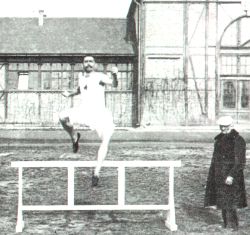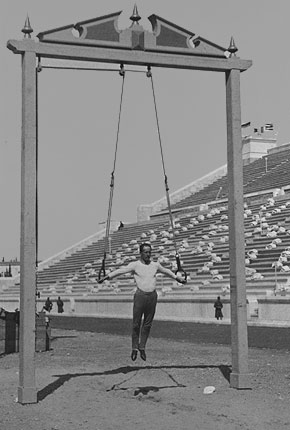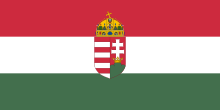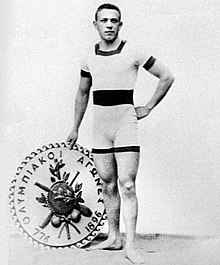At the 1896 Summer Olympics, two tennis events were contested, both for men. They began on 8 April and continued on 9 April, 10 April, and 11 April. 13 or 15 competitors from six nations, including seven Greeks, took part in the tennis competition. Many of the doubles teams were of mixed nationality, including all three medalist pairs. None of the leading players of the time such as Wimbledon champion Harold Mahony, U.S champion Robert Wrenn, William Larned or Wilfred Baddeley participated. To strengthen the field, the organization added sportsmen from other Olympic events, including weightlifter Momčilo Tapavica, hammer thrower George S. Robertson and 800-metres runners Edwin Flack and Friedrich Traun.

At the 1896 Summer Olympics, three fencing events were contested at the Zappeion. They were prepared and organized by the Sub-Committee for Fencing. The épée event for men was cancelled. All fencing was done to three touches. Events were held on 7 April and 9 April 1896. 15 athletes from four nations competed; 8 fencers from 3 nations won one medal each.

At the 1896 Summer Olympics, the first modern Olympiad, twelve athletics events were contested. A total of 25 medals were awarded. The medals were later denoted as 37 modern medals. All of the events except the marathon were held in the Panathinaiko Stadium, which was also the finish for the marathon. Events were held on 6 April, 7 April, 9 April, and 10 April 1896. Altogether, 63 athletes, all men, from nine nations competed. This made athletics the most international of the nine sports at the 1896 Games.

Australia competed at the 1896 Summer Olympics in Athens, Greece, from 6 to 15 April 1896. One athlete from Victoria, a British colony which later formed part of Australia, competed at the 1896 Summer Olympics in Athens, Greece. Edwin Flack was born in England and was resident in London in 1896, but spent most of his life in Australia and so is considered an Australian athlete by the International Olympic Committee.

Three sportsmen from Austria competed at the 1896 Summer Olympics. Though Austria was then a part of Austria-Hungary, most sources separate Austrian competitors from the Hungarians at the 1896 Games.

Three athletes from Denmark competed in five sports at the 1896 Summer Olympics in Athens. Two of the three combined to win a gold medal, two silvers, and three bronzes, while Eugen Schmidt earned no medals. Viggo Jensen contributed one of each color, while Holger Nielsen earned the second silver and two bronzes. Shooting and weightlifting were Denmark's most successful sports. Denmark had 15 entries in 12 events, winning six medals.

France competed at the 1896 Summer Olympics in Athens, Greece, from 6 to 15 April 1896. French athletes had appeared in every Summer Olympic Games of the modern era, alongside Australia, Great Britain, and Greece. France won the fourth-most gold medals with 5 and the fourth-most total medals with 11. Cycling was the sport in which the French competitors had the most success, as they completely dominated the field. The French team had 27 entries in 18 events, winning 11 medals.

Germany competed at the 1896 Summer Olympics in Athens, Greece. The Germans were the third most successful nation in terms of both gold medals and total medals (13). Gymnastics was the sport in which Germany excelled. The German team had 19 athletes. The Germans had 75 entries in 26 events, taking 13 medals.

Ten athletes from the United Kingdom of Great Britain and Ireland competed in seven sports at the 1896 Summer Olympics. The Great Britain athletes were the fifth most successful in terms of overall medals (7) and tied for fifth in gold medals (2). The 7 medals came on 23 entries in 14 events.

Greece was the host nation of the 1896 Summer Olympics held in Athens. The number of Greek contestants is commonly cited as 169, but as many as 176 Greeks contested events in all nine sports. The Greeks were by far the most successful nation in terms of total medals with 47, 27 more than the United States of America. Nevertheless, their number of first-place finishes (10) was one fewer than the Americans' 11. The Greeks had 172 entries in 39 events. Only 4 events had no Greek entrants—the 400 metres and the high jump in athletics and the vault and the team horizontal bar in gymnastics.

One competitor from Sweden was present at the 1896 Summer Olympics. He competed in athletics and gymnastics, with 5 entries in as many events. Sweden was one of four nations present that won no medals; Italy, Chile and Bulgaria were the others.

Three competitors from Switzerland competed in two sports at the 1896 Summer Olympics. The Swiss won one championship and placed second in two more events, for a total of three medals. They had 8 entries in 5 events.

Fourteen competitors from the United States competed in three sports at the 1896 Summer Olympics in Athens, Greece. The Americans were the most successful athletes in terms of gold medals, beating host nation Greece, 11 to 10, despite fielding only 14 competitors compared to an estimated 169 Greek entrants. However, the Greeks' 46 total medals dwarfed the Americans' 20.

The first heat of the men's 100 metres race was the first event run at the modern Olympics, on 6 April 1896. The event consisted of 3 heats and a final, held on 10 April. The 100 metres was the shortest race on the Athletics at the 1896 Summer Olympics programme. 15 athletes from 8 nations competed. The event was won by Thomas Burke of the United States. Fritz Hofmann of Germany took second, with Hungarian Alajos Szokolyi and American Francis Lane tying for third. These competitors are recognized as gold, silver, and bronze medalists by the International Olympic Committee, though that award system had not yet been implemented in 1896.
The men's 1500 metres race, the longest flat-track race of the 1896 Summer Olympics programme, was the last event on 7 April. It was run in a single heat, with eight athletes competing.

The men's 110 metres hurdles was the only hurdling event on the Athletics at the 1896 Summer Olympics programme. The preliminary heats were the first track event of the day on 7 April. Eight competitors ran in two heats of four runners each. Only the fastest two runners in each heat advanced to the final. The event was won by Thomas Curtis of the United States.
The men's shot put was one of two throwing events on the Athletics at the 1896 Summer Olympics programme. Seven athletes took part in the shot put competition on 7 April. The two Greek athletes both won medals, with Gouskos battling closely with Garrett of the United States for the longest distance.

The men's rings was one of eight gymnastics events on the Gymnastics at the 1896 Summer Olympics programme. The fifth event, it was held on 9 April. There were eight competitors from three nations. The Greeks won the gold and bronze medals, with Hermann Weingärtner winning his fifth medal. Places 1–3 and 5 are known, but 4th place is not—any of the four athletes whose places are not known may have occupied the fourth position.

The men's 100 metre freestyle was one of the four swimming events on the Swimming at the 1896 Summer Olympics programme. The 100 metre freestyle race was the first of the swimming events. Ten swimmers entered the race. The two competitors from Austria-Hungary finished in the top two places, though no record distinguishes the places of the other eight competitors. The names of four of the Greek swimmers are not known. Alfréd Hajós of Hungary beat Otto Herschmann of Austria by less than a body length, with the other swimmers far behind. The Hungarian flag was hoisted, but the band began to play the Austrian anthem until the Hungarian team sang the Hungarian anthem (Himnusz).

The men's 500 metre freestyle was one of the four swimming events on the Swimming at the 1896 Summer Olympics programme.




















